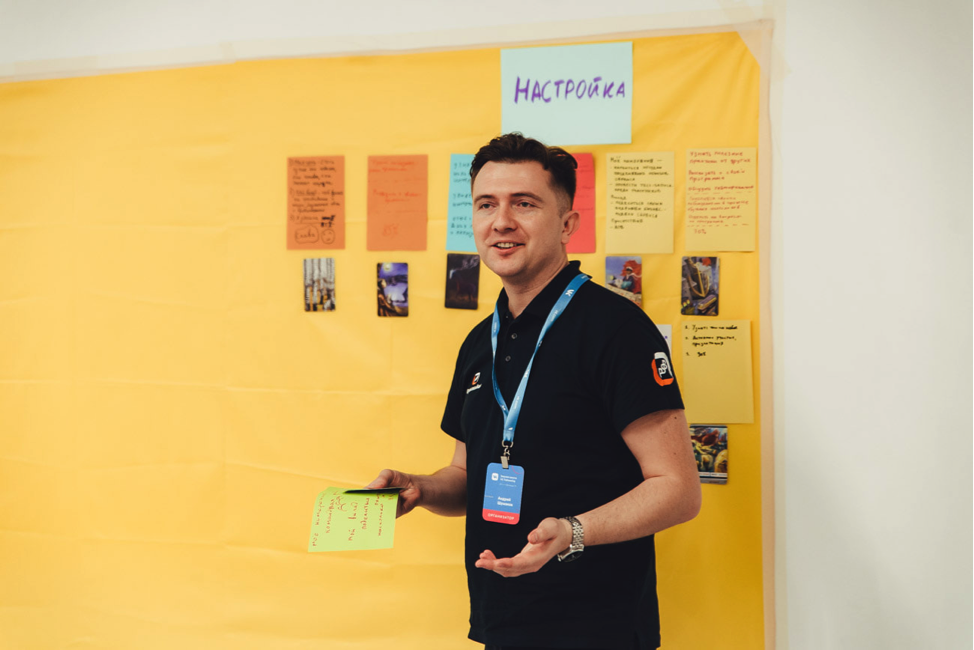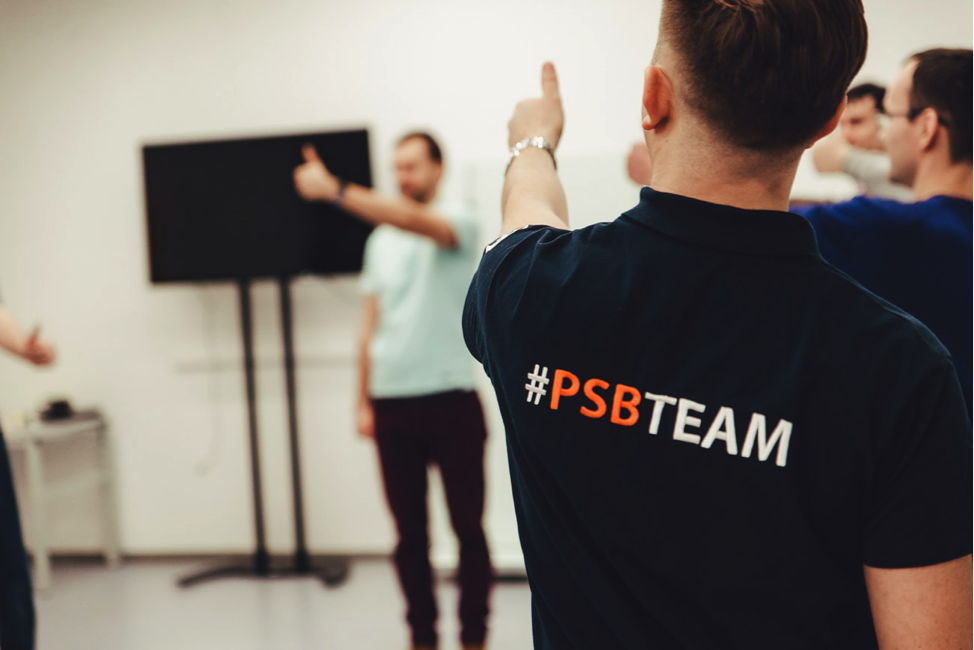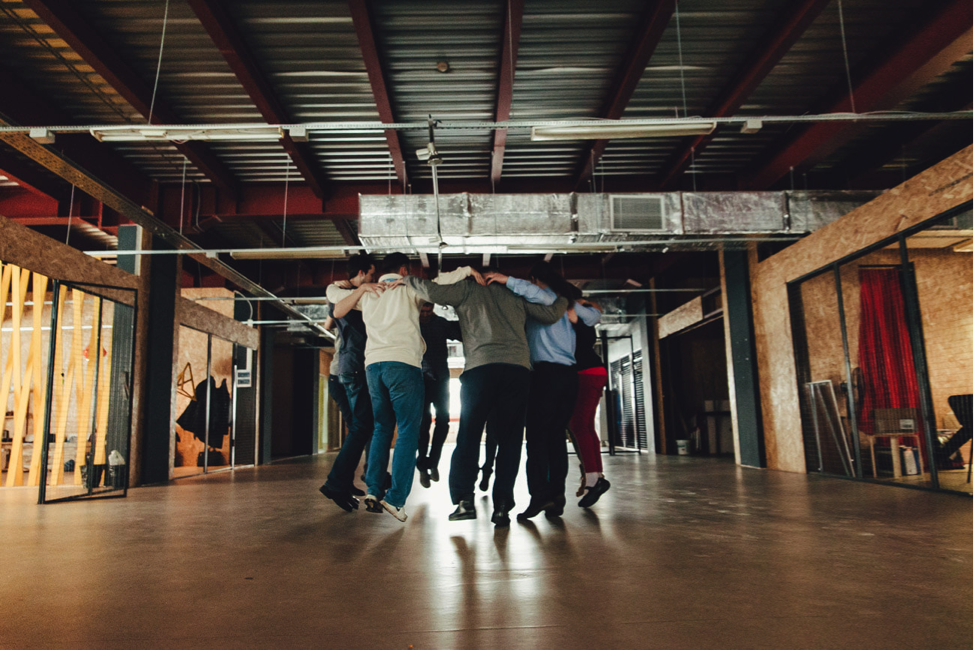How to look at tomorrow igrofikuuchi
From January 5 to January 7, the winter school of talented programming teachers - VKFellowship. Talented, because most of the students wrote their own courses, and their students win in the Olympiads. Why is there such a school for such class teachers? They, like anyone else, know that there is always something to learn.

The event was sponsored by Promsvyazbank, where I (yeah, in the photo above), Andrei Shumakov, work with teams of developers of banking products in digital channels. Our curator invited me to speak at the event, and I gladly agreed. My task in the company is to help development teams become more efficient in their work in order to achieve their business goals. About this I told the teachers at VKFellowship: how to use the project approach in the education of children.
My master class “went” - teachers now use the technique in their work. So I thought, suddenly you, habrovchane, also useful. After all, the main and so important for each of us is the skill that the project activity teaches, so look into tomorrow, so that even a hurricane with a tornado would not threaten your plans to walk a dog.

Product development in teams is a common practice. Here a cohesive team is working on common goals. But most importantly, the full involvement of each person in the process. This thought belongs to the French educator John Dewey. That is where the history of projects in Russian education begins. Teamwork helps to learn new information through joint activities. Even about yourself. For example, uncover unprecedented creative ability. How to involve a person so that he completely devotes himself to work? Give tasks that he can.
Stages of the project:
And of course, we make a plan. Even if it is not respected, it is still needed. The goal setting is on the curator / teacher, and the tasks are on students / workers. Complex goals are achieved iteratively, in stages of the same length. Each stage can have its own small goal.
Gamification is useful in both short and long stages. For example, you can transfer a project to the playing field with its own rules and bonuses.

Now you need to determine whether the goal is reached. To do this correctly, you need to offer evaluation criteria. Moreover, to avoid insults, the work can be not only "complicated" and "simple". If we consider the children's team, then the examples may be as follows: “complex” is “elephant”, and “simple” is “mouse”. The team can come up with their own definitions and rating scale. The approach is well described in the game ZooPoints. Such assessments will help to evenly distribute the tasks in the group and together achieve success.
The element of competition for comparing the results of teams should always be. It can be evaluated collectively, so it is important to identify general criteria of readiness for a specific training project. These criteria are best reflected in the NexusZoo game. Here, teams receive a set of identical rules for checking the result and the task of making an album of animals from the zoo.
The game consists of several rounds of the same length, where, after each team, conclusions are drawn, and the leader evaluates readiness according to specified criteria. At the end of the team come to the conclusion, based on personal experience, that the result of the work of those who best met the criteria is more qualitative and more beautiful. Well, when the result is estimated by many people. They will give constructive criticism and even give more ideas. A fresh look is always helpful!

The project work combines theory and practice, experienced people and beginners. Filonit and go on the success of others will not work: enough work for everyone. The result achieved brings pleasure to everyone: the confidence of the participants and their self-realization is growing. And a team really becomes a team only when the rule is fulfilled: everyone sees and appreciates the contribution of the other. And it is worth a lot.
It is difficult to work with a team, but today's world cannot be changed alone. Even geniuses and supermasters of their work can hardly do this. Therefore, first the employer evaluates your skill to be a team player and then the competence. And where to acquire the ability to work on the principle of "one for all and all for one," if not since school years?

The event was sponsored by Promsvyazbank, where I (yeah, in the photo above), Andrei Shumakov, work with teams of developers of banking products in digital channels. Our curator invited me to speak at the event, and I gladly agreed. My task in the company is to help development teams become more efficient in their work in order to achieve their business goals. About this I told the teachers at VKFellowship: how to use the project approach in the education of children.
My master class “went” - teachers now use the technique in their work. So I thought, suddenly you, habrovchane, also useful. After all, the main and so important for each of us is the skill that the project activity teaches, so look into tomorrow, so that even a hurricane with a tornado would not threaten your plans to walk a dog.

Product development in teams is a common practice. Here a cohesive team is working on common goals. But most importantly, the full involvement of each person in the process. This thought belongs to the French educator John Dewey. That is where the history of projects in Russian education begins. Teamwork helps to learn new information through joint activities. Even about yourself. For example, uncover unprecedented creative ability. How to involve a person so that he completely devotes himself to work? Give tasks that he can.
Stages of the project:
- we define a specific, measurable, achievable, meaningful and time-limited goal;
- determine the minimum number of participants;
- we determine possible problems;
- use past experience;
- we determine the methods of research and collection of information.
And of course, we make a plan. Even if it is not respected, it is still needed. The goal setting is on the curator / teacher, and the tasks are on students / workers. Complex goals are achieved iteratively, in stages of the same length. Each stage can have its own small goal.
Gamification is useful in both short and long stages. For example, you can transfer a project to the playing field with its own rules and bonuses.

Now you need to determine whether the goal is reached. To do this correctly, you need to offer evaluation criteria. Moreover, to avoid insults, the work can be not only "complicated" and "simple". If we consider the children's team, then the examples may be as follows: “complex” is “elephant”, and “simple” is “mouse”. The team can come up with their own definitions and rating scale. The approach is well described in the game ZooPoints. Such assessments will help to evenly distribute the tasks in the group and together achieve success.
The element of competition for comparing the results of teams should always be. It can be evaluated collectively, so it is important to identify general criteria of readiness for a specific training project. These criteria are best reflected in the NexusZoo game. Here, teams receive a set of identical rules for checking the result and the task of making an album of animals from the zoo.
The game consists of several rounds of the same length, where, after each team, conclusions are drawn, and the leader evaluates readiness according to specified criteria. At the end of the team come to the conclusion, based on personal experience, that the result of the work of those who best met the criteria is more qualitative and more beautiful. Well, when the result is estimated by many people. They will give constructive criticism and even give more ideas. A fresh look is always helpful!

The project work combines theory and practice, experienced people and beginners. Filonit and go on the success of others will not work: enough work for everyone. The result achieved brings pleasure to everyone: the confidence of the participants and their self-realization is growing. And a team really becomes a team only when the rule is fulfilled: everyone sees and appreciates the contribution of the other. And it is worth a lot.
It is difficult to work with a team, but today's world cannot be changed alone. Even geniuses and supermasters of their work can hardly do this. Therefore, first the employer evaluates your skill to be a team player and then the competence. And where to acquire the ability to work on the principle of "one for all and all for one," if not since school years?
